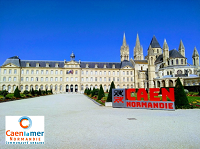Orateur
Description
We studied alpha-decay half-lives of 84 <= Z <= 92 in the semiclassical WKB approximation frame work using the density-dependent cluster model and the density distribution described by various Korea-IBS-Daegu-SKKU (KIDS) models. Main goal of this work is to find a correlation between alpha-decay half-lives and the stiffness of the symmtery energy. Parameters of KIDS model are determined to reproduce the nuclear data (energy and charge radii of 40Ca, 48Ca and 208Pb) and the neutron star observations including constraints by NICER, tidal deformability from GW170817, and the maximum mass limit of neutron star observations. We used the KIDS models (A-D) which have distinctive values for the parameters controlling the stiffness of the nuclear matter equation of state. We found that alpha-decay half-lives increase systematically from KIDS-A model to KIDS-D model. This implies a correlation between alpha-decay half-lives and the symmetry energy. In this talk, we present our results and discuss their implications.

